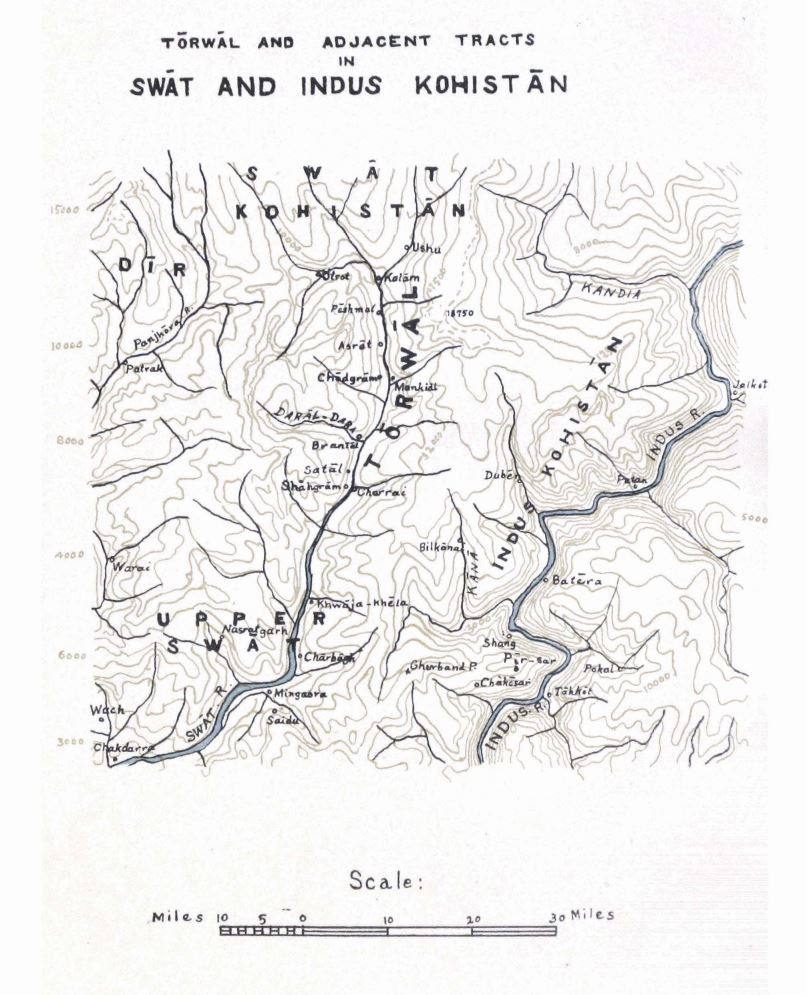The area where Torwali is spoken is also known as Torwal by other Dardic communities like Gawri and Kohsitani. In Torwali folk literature, the entire area is referred to Tu:aal (Torwal); for example, in this Torwali couplet: Du zar Tu:aal hu shid egi Saidu si Bachaa, Thamurd Jaen Chi Dherina wa ni hi yi Panah” (Torwali, 2016) “Two thousand Torwal as well as the Ruler of Saidu knew, that (she) is still alive—didn’t sink into the earth.”

دُو زر تُوال ہُوئی شِد ایگی سیدُو سی باچا
تھامُوڑ جأن چھی، نی ہی دھیریِنا وا پناہ
Another couplet in Torwali says, “Tu:aal Shid Hu Maasho Aa Khae Burai Ingola, Mhery Sha-e Theli Hey Mhi Sherin Lupata (Gul, 2017)”. “Auntie, Torwal came to know [of my love]; how I hide my beloved. Now let me put it [beloved] on my head as it is now my sweet dupatta”.

تُوال شِد ہُو ماشو آ کھأ بُورئی انگولا
مھیرے ݜا ئے تھیلی ہے مھی شیریِن لُوپٹا
Another Torwali ʐo couplet states:
مینتوب بُوڑے کیشُو نے أشی زلزلہ
ہُورامزا مھأ دُو زر تُوال سی کی پدندا
Məyəntob buɾe kiʃu ne æʃi zəlzəla
Huramza mʰæ du zər tu:a:l si ki pədənda
“Never did the earth tremored due to love affairs done by all,
But Huramza has made me enemy of two thousand Torwal”.
George A. Grierson has shown the area from Madyan town to the boundary of Kalam as Torwal in his map of the area (Grierson, 1929). Aurel Stein (Stein, Reprint 2000, p. 89), however, mentions the entire area beyond Churrai (Madyan) as Swat Kohistan or Torwal in his book, On Alexander’s Track to the Indus. A history of the Pushtuns, Towarikh Hafiz Rahmat Ali (Histories of Rahmat Ali), was written by ancient scholars and reproduced by Mirza Muhammad Ismail Qandahari in 1864 CE for the orientalist[1], H.W. Roverty (Tahir, 1979) mentions Torwal as well. It states that the entire Swat to Torwal[2] and Tirat (Shah, 1979) areas were under the rule of Khan Kaju. The area now becomes the area of the sub-division/tehsil Bahrain in Swat which is about 59.6 percent of the entire area of district Swat (CDO, 2014). The Torwal area was brought under the rule of the Swat State by 1922 (Barth, 1956) after a number of small-scale wars with the Torwali people, though they used to be wild and had no cohesion (Hay, 1934). Dr. Leitner mentions the area as Torwal in his travel account, ‘A Rough Account, collected in 1886, of Itineraries in the “Neutral Zone” between Central Asia and India’ (Chaghatai, 2002) and states, ‘There are many wealthy people in Branihal [today’s Bahrain], which may be considered to be the capital of Torwal’.
Like other Dardic communities, the Torwali people did not know where they and their language originated. The majority of the Torwali attributed, and many still do so, their descent to Arabs by “boasting an Arab origin” (Hay, 1934) and call themselves Kohistani, an identity given to them by the Pathans (Barth, 1956), who captured their lands and converted them to Islam. This can be due to the fact that “the Dards unfortunately did not succeed in arousing comparable interest” (Jetmar, 1961), and their history and origin remained shrouded in the debris of history. A few reports about them have been written by the British colonial officers during their service in the mountains, but the reports are not generally known about (Jetmar, 1961).
By Zubair Torwali
[1] H.W Roverty wrote this note on the book in 1862 “This is a copy of a very unique and rare work, containing an account of the movements of the Yusafsaies and other tribes of Pashtonah. I know but of one copy.”
[2] The reference here is to the entire area, which is now known as Kohistan of Swat or Swat Kohistan. At that time it was known as Torwal.

References
- Barth, F. (1956). Indus and Swat Kohistan-an Ethnographic Survey (Vol. II). Oslo: Forenede Trykkerier.
- CDO. (2014). Divisional Profile: Kalam Forest Division Swat KPK.
- Chaghatai, M. I. (2002). Writings of Dr. Leitner: Islam, Education, Dardistan, Politics and Culture of Northern Areas. Lahore, Pakistan: Government College Research and Publication Society & Sang-e-Meel Publications.
- Grierson, G. A. (1929). Torwali An Account of a Dardic Language in Swat-Kohistan. UK: Asian Educational Services.
- Gul, S. (2017, August 26). (Z. Torwali, Interviewer, & Z. Torwali, Translator) Bahrain Swat, Pakistan.
- Hay, R. W. (1934). The Yousafzai State of Swat. The Geographical Journal, 84(3), 241. doi:10.2307/1785758
- Jetmar, K. (1961, February ). Ethnological Research in Dardistan 1958 preliminary report. Proceedings of the American Philosophical Society, 105(1), 79-97.
- Shah, P. M. (1979). Tuwarikh Rahmat Khani. (P. Academy, Trans.) Peshawar: Pashto Academy, University of Peshawar.
- Stein, A. (Reprint 2000). On Alexander’s Track to the Indus. New Delhi, India: Bahvana Books & Prints.
- Tahir, M. N. (1979). Preface to Tuwarikh Rahmat Khani. (P. Academy, Trans.) Peshawar: Pashto Academy, University of Peshawar.
- Torwali, Z. (2016, September 22). (N. A. Torwali, Interviewer)


